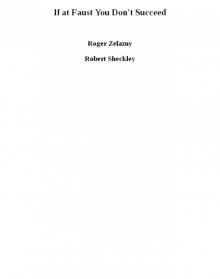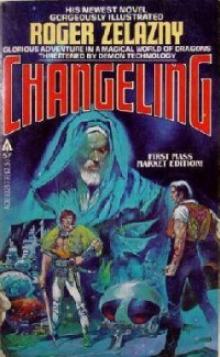- Home
- Roger Zelazny
My Name is Legion Page 3
My Name is Legion Read online
Page 3
Think of the status of the world economy, when it is known where every dime exists and where it is headed.
Think of the solving of traffic-control problems, land, sea, and air, when everything is regulated.
Think of ... Oh, hell!
I foresaw the coming of a Golden Era.
Crap!
A friend of mine having peripheral connections with the Mafia, it was, laughed at me, all starry in my eyes and just up from the university and into the federal service.
Do you seriously believe that every asset will be registered? Every transaction recorded? he'd asked me.
Eventually.
They haven't pierced Switzerland yet; and if they do, other places will be found.
There will be a certain allowance for residuals.
Then don't forget mattresses, and holes in the backyard. Nobody knows how much money there really is in the world, and no one ever will.
So I stopped and thought and read up on economics. He was right. The things for which we were writing programs in this area were, basically, estimates and approximates, vis-à-vis that which got registered, a reconciliation factor included.
So I thought about travel. How many unregistered vessels? Nobody knew. You can't keep statistics on items for which you have no data. And if there is to be unregistered money, more vessels could be constructed. There is a lot of coastline in the world. So traffic control might not be as perfect as I had envisioned.
Medical? Doctors are as human and lazy as the rest of us. I suddenly realized that all medical reports might not get filed, especially if someone wanted to pocket the cash and not pay taxes on it, and was not asked for a receipt.
When it came to people, I had forgotten the human factor.
There were the shady ones, there were people who just liked their privacy, and there were those who would honestly foul up the reporting of necessary information. All of them people who would prove that the system was not perfect.
Which meant that the thing might not work in precisely the fashion anticipated. There might also be some resentment, some resistance, along with actual evasion. And perhaps these might even be warranted ...
But there was not much overt resistance, so the project proceeded. It occurred over a period of three years. I worked in the central office, starting out as a programmer. After I'd devised a system whereby key weather stations and meteorological observation satellites fed their reports directly into the central system, I was promoted to the position of senior programmer and given some supervisory responsibility.
By then, I had learned sufficient of the project so that my doubts had picked up a few small fears as companions. I found myself beginning to dislike the work, which made me study it all the more intensely. They kidded me about taking work home with me. No one seemed to realize that it was not dedication, but rather a desire, born of my fears, to learn all that I could about the project. Since my superiors misread my actions, they saw that I was promoted once more.
This was fine, because it gave me access to more information, at the policy level. Then, for a variety of reasons, there came a spate of deaths, promotions, resignations, retirements. This left things wide open for fair-haired boys, and I rose higher within the group.
I came to be an adviser to old John Colgate, who was in charge of the entire operation.
One day, when we had just about achieved our mission, I told him of my fears and my doubts. I told the gray-haired, sallow-faced, spaniel-eyed old man that I felt we might be creating a monster and committing the ultimate invasion of human privacy.
He stared at me for a long while, fingering the pink coral paperweight on his desk; then, You may be right, he said. What are you going to do about it?
I don't know, I replied. I just wanted to tell you my feelings on the matter.
He sighed then and turned in his swivel chair and stared out the window.
After a time, I thought he had gone to sleep, as he sometimes did right after lunch.
Finally, though, he spoke: Don't you think I've heard those arguments a thousand times before?
Probably, I replied, and I've always wondered how you might have answered them.
I have no answers, he said abruptly. I feel it is for the better, or I would not be associated with it. I could be wrong, though. I will admit that. But some means has to be found to record and regulate all the significant features of a society as complex as ours has become. If you think of a better way of running the show, tell me about it.
I was silent. I lit a cigarette and waited for his next words. I did not know at the time that he only had about six months of life remaining to him.
Did you ever consider buying out? he finally asked.
What do you mean?
Resigning. Quitting the system.
I'm not sure that I understand ...
We in the system will be the last to have our personal records programmed in.
Why?
Because I wanted it that way, in case anyone came to me as you have today and asked me what you have asked me.
Has anyone else done it?
I would not say if they had, to keep the intended purity of the thing complete.
'Buying out.' By this, I take it that you mean destroying my personal data before someone enters it into the system?
That is correct, he said.
But I would not be able to get another job, with no academic record, no past work history ...
That would be your problem.
I couldn't purchase anything with no credit rating.
I suppose you would have to pay cash.
It's all recorded.
He swiveled back and gave me a smile. Is it? he asked me. Is it really?
Well, not all of it, I admitted.
So?
I thought about it while he lit his pipe, smoke invading wide, white sideburns. Was he just kidding me along, being sarcastic? Or was he serious?
As if in answer to my thought, he rose from his chair, crossed the room, opened a file cabinet He rummaged around in it for a time, then returned holding a sheaf of punchcards like a poker hand. He dropped them onto the desk in front of me.
That's you, he said. Next week, you go into the system, like everybody else, and he puffed a smoke ring and reseated himself.
Take them home with you and put them under your pillow, he said. Sleep on them. Decide what you want to do with them.
I don't understand.
I am leaving it up to you.
What if I tore them up? What would you do?
Nothing.
Why not?
Because I do not care.
That's not true. You're head of this thing.
He shrugged.
Don't you believe in the value of the system yourself?
He dropped his eyes and drew on his pipe.
I am no longer so certain as once I was, he stated.
If I did this thing I would cease to exist, officially, I said.
Yes.
What would become of me?
That would be your problem.
I thought about it for a moment; then, Give me the cards, I said.
He did, with a gesture.
I picked them up, placed them in my inside coat pocket.
What are you going to do now?
Sleep on them, as you suggested, I said.
Just see that you have them back by next Tuesday morning.
Of course.
And he smiled, nodded, and that was it.
I took them, went home with them. But I didn't sleep.
No, that's not it. I wouldn't sleep, couldn't sleep.
I thought about it for centuries, well, all night long, pacing and smoking. To exist outside the system ... How could I do anything if it did not recognize my existence?
Then, about four in the morning, I decided that I should have phrased that question the other way around.
How could the system recognize me, no matter what I did?
I sa
t down then and made some careful plans. In the morning, I tore my cards through the middle, burned them, and stirred the ashes.
Over a minute must have gone by; then, All right, tell us the whole story, he said.
I obtained this job through a placement bureau, I told him. I accepted it, came to work, performed my duties, met you. That's it.
It has been said for some time, and we believe it to be true, that the government can obtain permission, for security reasons, to create a fictitious individual in the central records. An agent is then fitted into that slot in life. If anyone is able to check on him, his credentials appear to be bona fide.
I didn't answer him.
Is that true? he asked.
Yes, I said. It has been said that this can be done. I don't know whether it's true or not, though.
You do not admit to being such an agent?
No.
Then they whispered to one another for a time. Finally, I heard a metal case click open.
You are lying.
No, I'm not. I maybe save a couple guys' lives and you start calling me names. I don't know why, though I'd like to. What have I done that's wrong?
I'll ask the questions. Mister Schweitzer.
I'm just curious. Perhaps if you would tell me ...
Roll up your sleeve. Either one, it doesn't matter.
Why?
Because I told you to.
What are you going to do?
Administer an injection.
Are you an M.D.?
That is none of your business.
Well, I refuse it, for the record. After the cops get hold of you, for a variety of reasons, I'll even see to it that the Medical Association is on your back.
Your sleeve, please.
Under protest, I observed, and I rolled up the left one. If you're to kill me when you've finished playing games, I added, murder is kind of serious. If you are not, I'll be after you. I may find you one day ...
I felt a sting behind my biceps.
Mind telling me what you gave me? I asked.
It's called TC-6, he replied. Perhaps you've read about it. You will retain consciousness, as I might need your full reasoning abilities. But you will answer me honestly.
I chuckled, which they doubtless attributed to the effects of the drug, and I continued practicing my yoga breathing techniques. These could not stop the drug, but they made me feel better. Maybe they gave me a few extra seconds, also, along with the detached feeling I had been building up.
I keep up on things like TC-6. This one, I knew, left you rational, unable to lie, and somewhat literal-minded. I figured on making the most of its weak points by flowing with the current. Also, I had a final trick remaining.
The thing that I disliked most about TC-6 was that it sometimes had a bad side effect, cardiac-wise.
I did not exactly feel myself going under. I was just suddenly there, and it did not feel that different from the way I always feel. I knew that to be an illusion. I wished I had had prior access to the antidote kit I kept within a standard-looking first-aid kit hidden in my dresser.
You hear me, don't you? he asked.
Yes, I heard myself saying.
What is your name?
Albert Schweitzer, I replied.
There were a couple of quick breaths taken behind me, and my questioner silenced the other fellow, who had started to say something.
Then, What do you do? he asked me.
I'm a technician.
I know that much. What else?
I do many things ...
Do you work for the government, any government?
I pay taxes, which means I work for the government, part of the time. Yes.
I did not mean it in that sense. Are you a secret agent in the employ of any government?
No.
A known agent?
No.
Then why are you here?
I am a technician. I service the machines.
What else?
I do not ...
What else? Who else do you work for, besides the Project?
Myself.
What do you mean?
My activities are directed to maintaining my personal economic status and physical well-being.
I am talking about other employers. Have you any?
No.
From the other man, I heard, He sounds clean.
Maybe. Then, to me, What would you do if you met me somewhere and recognized me?
Bring you to law.
... And failing that?
If I were able, I would hurt you severely. Perhaps I would kill you, if I were able to give it the appearance of self-defense or make it seem to be an accident.
Why?
Because I wish to preserve my own physical wellbeing. The fact that you had disturbed it once means that you might attempt it again. I will not permit this access to me.
I doubt that I will attempt it again.
Your doubts mean nothing to me.
So you saved two lives today, yet you are willing to take one.
I did not reply.
Answer me.
You did not ask me a question.
Could he have drug-consciousness? asked the other.
I never thought of that ... Do you?
I do not understand the question.
This drug allows you to remain oriented in all three spheres. You know who you are, where you are, and when you are. It saps that thing called the will, however, which is why you must answer my questions. A person with a lot of experience with truth drugs can sometimes beat them, by rephrasing the questions to himself and giving a literally honest reply. Is this what you are doing?
That's the wrong question, said the other.
What's right?
Have you had any prior experience with drugs? that one asked me.
Yes.
What ones?
I've had aspirin, nicotine, caffeine, alcohol ...
Truth serums, he said. Things like this, things that make you talk. Have you had them before?
Yes.
Where?
At Northwestern University.
Why?
I volunteered for a series of experiments.
What did they involve?
The effects of drugs on consciousness.
Mental reservations, he said to the other. It could take days. I think he has primed himself.
Can you beat a truth drug? the other one asked me.
I do not understand.
Can you lie to us, now?
No.
Wrong question, again, said the shorter. He is not lying. Anything he says is literally true.
So how do we get an answer out of him?
I'm not sure.
So they continued to hit me with questions. After a time, things began to wane.
He's got us, said the shorter one. It would take days to beat him down.
Should we ... ?
No. We've got the tape. We've got his answers. Let's let a computer worry about it.
But by then it was near morning, and I had the funny feeling, accompanied by cold flashes on the back of my neck, that I might be able to manage a fib or three once again. There was some light on the other side of my portholes. They had been going at me for what seemed to be many hours. I decided to try.
I think this place is bugged, I said.
What? What do you mean?
Ship's Security, I stated. I believe all technicians are so monitored.
Where is it?
I don't know.
We've got to find it, said the one.
What good will it do? said the other, in a whisper, for which I respected him, as whispers do not often get recorded. They'd have been here long before this, if it were.
Unless they're waiting, letting us hang ourselves.
The first began looking, however, and I rose, met with no objections, and staggered across the room to collapse upon the bed.
My right hand slipped down around the he
adboard, as though by accident. It found the gun.
I flipped off the safety as I withdrew it. I sat upon the bed and pointed it at them.
All right, morons, I said. Now you answer my questions.
The big one made a move toward his belt and I shot him in the shoulder.
Next? I asked, tearing away the silencer, which had done its work, and replacing it with a pillow.
The other man raised his hands and looked at his buddy.
Let him bleed, I said.
He nodded and stepped back.
Sit down, I told them both.
They did.
I moved over behind the two of them.
Give me that arm, and I took it. I cleaned it and dressed it, as the bullet had gone on through. I had placed their weapons on the dresser. I tore off their hankies and studied their faces. I did not know them from anywhere.
Okay, why are you here? I asked. And why do you want to know what you want to know?
There were no replies.
I don't have as much time as you did, I said. So I'm about to tape you in place. I don't think I can afford to fool around with drugs.
I fetched the adhesive tape from the medicine chest and did it.
These places are pretty soundproof, I remarked, putting the gun aside, and I lied about them being bugged ... So you can do a bit of screaming if you want. I caution you against it, however. Each one earns you one broken bone.
So who do you work for? I repeated.
I'm a maintenance man on the shuttler, said the shorter one. My friend is a pilot.
He received a dirty look for this.
Okay, I said. I'll buy that, because I've never seen you around here before. Think carefully over your answer to the next one: who do you really work for?
I asked this knowing that they did not have the advantages that I had had. I work for myself because I am self-employed, an independent contractor. My name is Albert Schweitzer right now, so that's what it is, period.
I always become the person I must. Had they asked me who I had been before, they might have gotten a different answer. It's a matter of conditioning and mental attitudes.
Who pulls the strings? I asked.
No replies.
All right, I said. I guess I'll have to ask you in a different fashion.
Heads turned toward me.
You were willing to violate my physiology for the sake of a few answers, I said. Okay. I guess I'll return the favor upon your anatomy. I'll get an answer or three, I promise. Only I'll be a little more basic about it. I'll simply torture you until you talk.

 Seven Tales in Amber
Seven Tales in Amber Frost and Fire
Frost and Fire Doorways in the Sand
Doorways in the Sand Unicorn Variation
Unicorn Variation A Night in the Lonesome October
A Night in the Lonesome October Madwand
Madwand Jack Of Shadows
Jack Of Shadows Lord of Light
Lord of Light The Doors of His Face, The Lamps of His Mouth and Other Stories
The Doors of His Face, The Lamps of His Mouth and Other Stories Guns Of Avalon tcoa-2
Guns Of Avalon tcoa-2 Coils
Coils The Last Defender Of Camelot
The Last Defender Of Camelot Creatures of Light and Darkness
Creatures of Light and Darkness This Immortal
This Immortal Trumps of doom tcoa-6
Trumps of doom tcoa-6 The Dream Master
The Dream Master The Complete Dilvish, The Damned
The Complete Dilvish, The Damned Nine Princes in Amber
Nine Princes in Amber If at Faust You Don't Succeed
If at Faust You Don't Succeed Here there be dragons
Here there be dragons The Doors Of His Face, The Lamps Of His Mouth
The Doors Of His Face, The Lamps Of His Mouth The Great Book of Amber - Chronicles 1-10
The Great Book of Amber - Chronicles 1-10 Madwand (Illustrated)
Madwand (Illustrated) The Chronicles of Amber
The Chronicles of Amber To Die In Italbar
To Die In Italbar The Changing Land
The Changing Land The Furies
The Furies Nine Princes In Amber tcoa-1
Nine Princes In Amber tcoa-1 Last Of The Wild Ones
Last Of The Wild Ones Sign of the Unicorn tcoa-3
Sign of the Unicorn tcoa-3 My Name is Legion
My Name is Legion Wizard World 1: Changeling
Wizard World 1: Changeling Changeling
Changeling The Shroudling and the Guisel (amber stories)
The Shroudling and the Guisel (amber stories) The Mask of Loki
The Mask of Loki A Farce To Be Reckoned With
A Farce To Be Reckoned With Roadmarks
Roadmarks When Pussywillows Last in the Catyard Bloomed (rtf)
When Pussywillows Last in the Catyard Bloomed (rtf) Hall of Mirrors (amber stories)
Hall of Mirrors (amber stories) Permafrost
Permafrost Changeling (Illustrated)
Changeling (Illustrated) Donnerjack
Donnerjack Shadows & Reflections: A Roger Zelazny Tribute Anthology
Shadows & Reflections: A Roger Zelazny Tribute Anthology The Courts Of Chaos tcoa-5
The Courts Of Chaos tcoa-5 Flare
Flare Doorsways in the Sand
Doorsways in the Sand The Great Book of Amber
The Great Book of Amber Home Is the Hangman
Home Is the Hangman For a Breath I Tarry
For a Breath I Tarry Isle Of The Dead
Isle Of The Dead Salesman Tale (amber stories)
Salesman Tale (amber stories) Dismal Light
Dismal Light Dilvish, The Damned
Dilvish, The Damned The Black Throne
The Black Throne Wizard World 2: Madwand
Wizard World 2: Madwand The Salesman's Tale
The Salesman's Tale